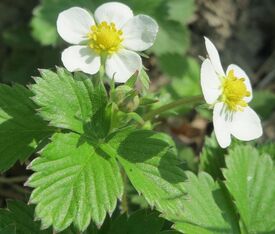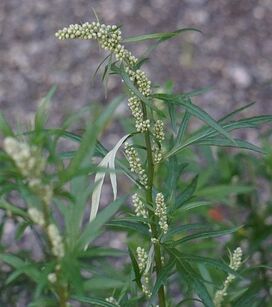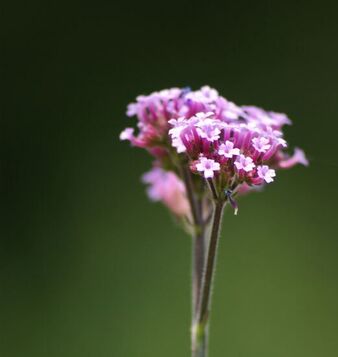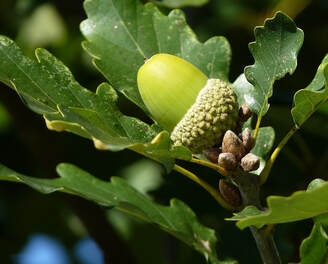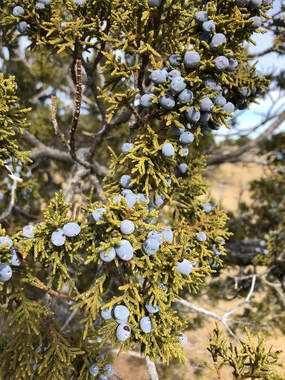Under the oaks and evergreens at 7420 feetWILD STRAWBERRY Wild strawberry runs along the trail. Tea of strawberry leaves and stems is valued for its mild astringent effects, and its antirheumatic, diuretic, antidiarrheal, tonic, and laxative properties. Strawberry is recommended in many traditions for intestinal sluggishness and for pregnancy, convalescence, and chronic stomach sensitivity when stronger herbs are contraindicated. WORMWOOD Known variously as 艾叶 (aiye), artemisia, or mugwort, wormwood is an intense bitter that stimulates underactive digestion and aids anemia. An anti-inflammatory and antidepressant, wormwood can be added as a potentiating factor to other preparations. Its active substances include essential oils, sesquiterpene lactones, azulenes, flavonoids, phenolic acids, and lignans. The whole plant is used as an antimalarial. Wormwood herbal tea is administered as a stomach stimulator and orexigenic. In Chinese medicine, wormwood warms the channels and stops bleeding. It dispels cold and alleviates pain, calms the fetus, resolves phlegm, and stops cough and asthma. As an aromatic, wormwood is used in sweat baths and saunas. Wormwood-juniper smudge sticks cleanse spaces and purge negativity. VERBENA The constituents of verbena or 马鞭草 (mabiancao, literally, horsewhip herb) include volatile oils, bitters, iridoids, alkaloids, mucilage, and tannins. It is a restorative, helpful for tension and long-term stress and good for convalescence from a long illness. The entire plant has sedative, tonic, diaphoretic, and anti-inflammatory properties and it is used to treat early-stage depression, melancholia, stress, and fever. Chinese medicine employs the bitter and cool properties of verbena to clear heat and remove toxicity, activate blood, disperse nodules, promote diuresis, and resolve swelling. It is indicated for jaundice caused by damp-heat, for fever due to external pathogens, and for dysmenorrhea or amenorrhea from blood stasis and abdominal masses. Its heat-clearing properties are used for severe sore throat and other accumulations of heat toxin including breast abscesses and swollen and painful gums. Extracts of lemon verbena and its major compound acteoside (ACT) have a regulatory effect on abnormal liver lipid metabolism; furthermore, ACT promotes lipolysis and fatty acid oxidation by increasing messenger RNA expression of adipose triglyceride lipase and carnitine palmitoyltransferase. OAK TREE The leaves, acorns, galls, and branches of oak trees contain tannin, quercetin, gallic acid, pectin, calcium, magnesium, and potassium. In various medical traditions, infusion of oak tree bark is administered internally to treat hemorrhoids, diarrhea, chronic dysentery, intestinal bleeding, and uterine bleeding, and, as a tea astringent, oak is applied externally to skin wounds, burns, mouth inflammation, toothaches, sore throats, and earaches. Oak gall possesses astringent, anti-inflammatory, antiviral, antidiabetic, larvicidal, antibacterial, and gastroprotective effects. Gallnuts have been sourced to produce drug therapies for cancerous diseases in traditional and folk medicine systems through the centuries, and the literature indicates that gallnuts contain a number of bioactive metabolites, accounting for their anticancer effects. Further screening of bioactive compounds is expected to yield valuable anticancer agents. JUNIPER The medicinal evergreen juniper or 杜松子(dusongzi) is resinous and aromatic. Internally, the leaves or berries have been used as a urinary antiseptic and for cystitis and urethritis, although juniper is contraindicated in people with kidney infection or chronic kidney weakness as the oils may be irritating to kidney inflammations. Juniper berries have diaphoretic and emmenagogue properties and the leaves have diuretic properties. In Chinese medicine, juniper works at the heart, spleen, and lung meridians and its key actions and medicinal uses include promoting digestion, warming the middle burner, expelling phlegm, warming the lungs, and cleansing the kidneys and liver. Topically, juniper is used to treat chronic skin irritations and as a relaxant. It relaxes the muscles and removes barriers to blood flow and energetic flow. Juniper is prized in many traditions for its ability to dispel tension and stagnation and the aromatic parts of the juniper plant have been employed as a protector against negativity. Juniper is known to have a stabilizing presence for those in need of safety and protection. Juniper's versatility extends to the culinary world and includes the flavoring of meat and sauerkraut and the distillation of gin. Please note: The herb information in this blog is presented for educational purposes only. The use of herbal preparations is not recommended without seeking the advice of a healthcare provider. Substances in herbal preparations may interact with prescription drugs to eliminate therapeutic efficacy or induce toxicity.
1 Comment
|
�
AuthorKerilyn Sappington is the founder of Integrative Translations, which specializes in the Chinese to English translation of topics in conventional and complementary medicine. Archives
June 2024
Tags
All
|

